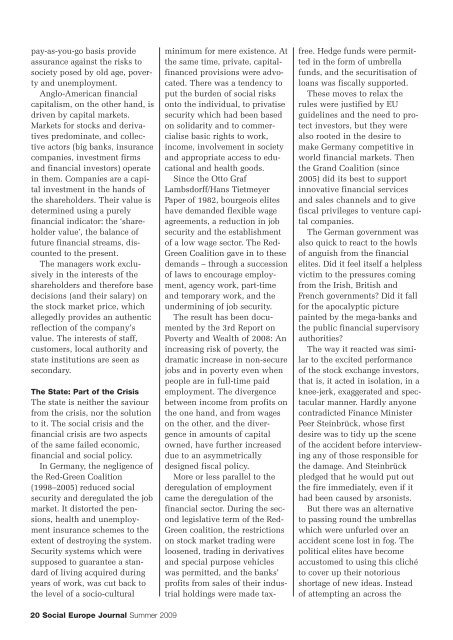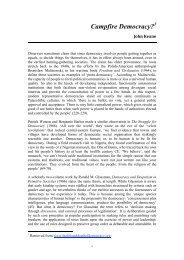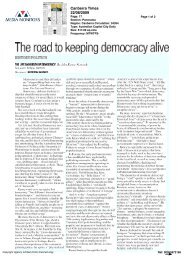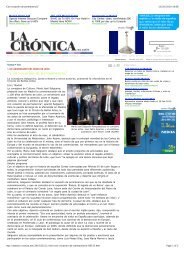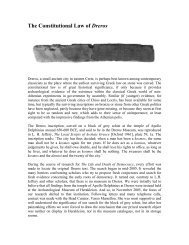The Ethics of Capitalism - Social Europe Journal
The Ethics of Capitalism - Social Europe Journal
The Ethics of Capitalism - Social Europe Journal
You also want an ePaper? Increase the reach of your titles
YUMPU automatically turns print PDFs into web optimized ePapers that Google loves.
pay-as-you-go basis provide<br />
assurance against the risks to<br />
society posed by old age, poverty<br />
and unemployment.<br />
Anglo-American financial<br />
capitalism, on the other hand, is<br />
driven by capital markets.<br />
Markets for stocks and derivatives<br />
predominate, and collective<br />
actors (big banks, insurance<br />
companies, investment firms<br />
and financial investors) operate<br />
in them. Companies are a capital<br />
investment in the hands <strong>of</strong><br />
the shareholders. <strong>The</strong>ir value is<br />
determined using a purely<br />
financial indicator: the ‘shareholder<br />
value’, the balance <strong>of</strong><br />
future financial streams, discounted<br />
to the present.<br />
<strong>The</strong> managers work exclusively<br />
in the interests <strong>of</strong> the<br />
shareholders and therefore base<br />
decisions (and their salary) on<br />
the stock market price, which<br />
allegedly provides an authentic<br />
reflection <strong>of</strong> the company’s<br />
value. <strong>The</strong> interests <strong>of</strong> staff,<br />
customers, local authority and<br />
state institutions are seen as<br />
secondary.<br />
<strong>The</strong> State: Part <strong>of</strong> the Crisis<br />
<strong>The</strong> state is neither the saviour<br />
from the crisis, nor the solution<br />
to it. <strong>The</strong> social crisis and the<br />
financial crisis are two aspects<br />
<strong>of</strong> the same failed economic,<br />
financial and social policy.<br />
In Germany, the negligence <strong>of</strong><br />
the Red-Green Coalition<br />
(1998–2005) reduced social<br />
security and deregulated the job<br />
market. It distorted the pensions,<br />
health and unemployment<br />
insurance schemes to the<br />
extent <strong>of</strong> destroying the system.<br />
Security systems which were<br />
supposed to guarantee a standard<br />
<strong>of</strong> living acquired during<br />
years <strong>of</strong> work, was cut back to<br />
the level <strong>of</strong> a socio-cultural<br />
minimum for mere existence. At<br />
the same time, private, capitalfinanced<br />
provisions were advocated.<br />
<strong>The</strong>re was a tendency to<br />
put the burden <strong>of</strong> social risks<br />
onto the individual, to privatise<br />
security which had been based<br />
on solidarity and to commercialise<br />
basic rights to work,<br />
income, involvement in society<br />
and appropriate access to educational<br />
and health goods.<br />
Since the Otto Graf<br />
Lambsdorff/Hans Tietmeyer<br />
Paper <strong>of</strong> 1982, bourgeois elites<br />
have demanded flexible wage<br />
agreements, a reduction in job<br />
security and the establishment<br />
<strong>of</strong> a low wage sector. <strong>The</strong> Red-<br />
Green Coalition gave in to these<br />
demands – through a succession<br />
<strong>of</strong> laws to encourage employment,<br />
agency work, part-time<br />
and temporary work, and the<br />
undermining <strong>of</strong> job security.<br />
<strong>The</strong> result has been documented<br />
by the 3rd Report on<br />
Poverty and Wealth <strong>of</strong> 2008: An<br />
increasing risk <strong>of</strong> poverty, the<br />
dramatic increase in non-secure<br />
jobs and in poverty even when<br />
people are in full-time paid<br />
employment. <strong>The</strong> divergence<br />
between income from pr<strong>of</strong>its on<br />
the one hand, and from wages<br />
on the other, and the divergence<br />
in amounts <strong>of</strong> capital<br />
owned, have further increased<br />
due to an asymmetrically<br />
designed fiscal policy.<br />
More or less parallel to the<br />
deregulation <strong>of</strong> employment<br />
came the deregulation <strong>of</strong> the<br />
financial sector. During the second<br />
legislative term <strong>of</strong> the Red-<br />
Green coalition, the restrictions<br />
on stock market trading were<br />
loosened, trading in derivatives<br />
and special purpose vehicles<br />
was permitted, and the banks’<br />
pr<strong>of</strong>its from sales <strong>of</strong> their industrial<br />
holdings were made tax-<br />
free. Hedge funds were permitted<br />
in the form <strong>of</strong> umbrella<br />
funds, and the securitisation <strong>of</strong><br />
loans was fiscally supported.<br />
<strong>The</strong>se moves to relax the<br />
rules were justified by EU<br />
guidelines and the need to protect<br />
investors, but they were<br />
also rooted in the desire to<br />
make Germany competitive in<br />
world financial markets. <strong>The</strong>n<br />
the Grand Coalition (since<br />
2005) did its best to support<br />
innovative financial services<br />
and sales channels and to give<br />
fiscal privileges to venture capital<br />
companies.<br />
<strong>The</strong> German government was<br />
also quick to react to the howls<br />
<strong>of</strong> anguish from the financial<br />
elites. Did it feel itself a helpless<br />
victim to the pressures coming<br />
from the Irish, British and<br />
French governments Did it fall<br />
for the apocalyptic picture<br />
painted by the mega-banks and<br />
the public financial supervisory<br />
authorities<br />
<strong>The</strong> way it reacted was similar<br />
to the excited performance<br />
<strong>of</strong> the stock exchange investors,<br />
that is, it acted in isolation, in a<br />
knee-jerk, exaggerated and spectacular<br />
manner. Hardly anyone<br />
contradicted Finance Minister<br />
Peer Steinbrück, whose first<br />
desire was to tidy up the scene<br />
<strong>of</strong> the accident before interviewing<br />
any <strong>of</strong> those responsible for<br />
the damage. And Steinbrück<br />
pledged that he would put out<br />
the fire immediately, even if it<br />
had been caused by arsonists.<br />
But there was an alternative<br />
to passing round the umbrellas<br />
which were unfurled over an<br />
accident scene lost in fog. <strong>The</strong><br />
political elites have become<br />
accustomed to using this cliché<br />
to cover up their notorious<br />
shortage <strong>of</strong> new ideas. Instead<br />
<strong>of</strong> attempting an across the<br />
20 <strong>Social</strong> <strong>Europe</strong> <strong>Journal</strong> Summer 2009


